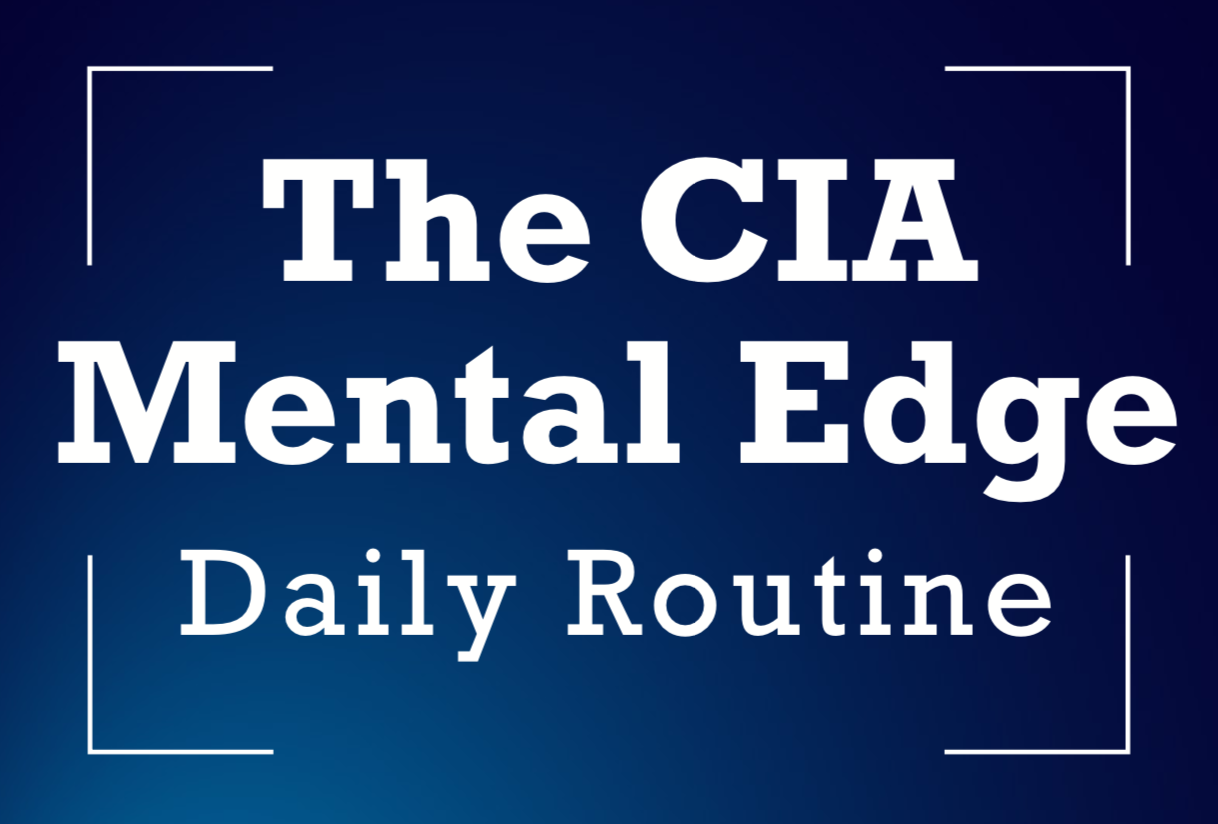Greetings Everyday Spy,
Welcome to your newest #SpyHACK!
I was recently invited to do a TV interview.
The producer sent me an email with a long list of ‘tips’ to help me prepare for the show.
- Wear a solid color shirt.
- Project your energy/excitement when you talk.
- Don’t eat within an hour of the interview.
While I appreciated some of the technical tips, like avoiding stripes on camera, I couldn’t help but laugh at the second half of the list…
- Think of the interview as a friendly conversation – it will keep you from getting nervous.
- Remember that we can edit any mistakes or errors afterward – don’t worry if you get flustered.
- Above all else, have FUN! You are on TV!
As I rounded out the producer’s tip-list, I was again reminded how different the entertainment world is from the real world.
And how much more interesting the real world is.
For everyday people, interviews are high-stakes.
- They are a chance to win a job.
- They are a chance to make more money.
- They are a chance to make a difference.
Interviews are as different from a ‘friendly conversation’ as it gets! You have no convenient editor to fix your mistakes afterward, and there is nothing ‘fun’ about being judged.
But high-stakes does not have to mean high-stress.
Job interviews are important. Everyone can agree to that.
But the pursuit of a job can get mutated into the pursuit of outside approval.
And not getting the job can start to feel like a personal failure.
Add in internet marketers looking for a buck, business bloggers looking for a click, and hiring managers trying to boost their stats and you get a list of ‘tips’ like I got from the TV producer…
- Always wear a tie.
- Do your best to smile.
- Come ready with a question.
Worthless advice that has no measurable proof.
Even worse, talented job seekers start to think that their wardrobe and posture are more important than their talent and passion.
CIA trains field officers to separate performance from reward.
Performance is something you control. You know when you work hard and when you cut corners; you know when you take risks or avoid risks. Even when other people try to motivate, trick, or force you to do something, only you decide if your performance changes.
Rewards, however, are a tool outsiders use to try to control you.
Rewards manipulate people – they do not motivate performance.
CIA uses rewards to turn once-proud patriots into covert US assets. And without realizing it, employers use rewards to manipulate low-performers into meeting standards, and high-performers into lowering standards.
When we change our performance based on rewards, we are being controlled rather than taking control.
But the people controlling the ‘reward’ don’t realize they are overlooking the same talent they are trying to capture:
- The 2019 workforce has 50% more advanced education than it did in 2001, but 65% of recruiters claim there is a lack of talent to fill vacancies.
- 75% of hiring managers use recruiting software; but 47% of recruiting software is obsolete by more than 5 years.
- The average corporate position gets 240 applications; but less than 20% of applicants are invited for interviews.
- Internal promotions average a 3% salary increase; but changing employers averages a 10%-20% increase in base salary.
Our world is full of talented, high-performing people looking to make a positive impact.
Employers want to hire, and people want to be hired.
- 42% of people between 18-32 are actively considering a new job.
- 20% of people over 35 are actively looking for a new job.
- 30% of the global workforce is comprised of job seekers.
Performance is not the problem.
The problem is that employers treat the job like a reward. And they want an interviewee to ‘earn’ the reward. That means the interview isn’t about the interviewee – it’s about interviewer.
And so the gap that CIA taught me in the field exists in every job interview; a gap between performance and reward.
And just like in HUMINT operations abroad, job interviews become a game of influence and control.
But human nature is inherently flawed. And understanding the flaws can put you in control instead of the person interviewing you.
Every time a high-performing #EverydaySpy wins the job, that gap between performance and reward closes.
So I want you to win the job; the promotion; the raise.
Every time.
Here is how you hack the job interview:
- Perceptive People
The human mind sees its own perceptions as reality.
As a result, people trust their own opinions over objective fact. You see this all around you – in politics, sports, gambling and even family debates.
The same way that your parents defend their parenting, hiring managers never question their interviewing skills.
They honestly believe they are excellent at assessing talent. Even though psychologists have proven that personal interviews are inherently flawed.
In 2012, psychologists from the University of Pennsylvania and Carnegie Mellon University conducted an experiment to test the accuracy of human interviews.
76 students were assessed in two groups:
- 38 students based on objective GPA performance and educational background only
- 38 students based on objective GPA/educational background PLUS a subjective human interview by and expert.
The goal was to see which assessment method (objective only vs. objective + interview) best predicted future GPA performance.
The results were overwhelming.
Human interviews dramatically misjudged student performance when compared against objective assessments.
Interviewers thought they were experts – in students, in grading, in human assessment. But instead they were flawed by their opinions, preferences and assumptions.
And they chose wrong.
The people choosing who to hire and who to pass over are unwittingly limiting their own talent pool.
So if you get passed over, keep in mind it may not be your fault. Your performance can be excellent even though you don’t get the ‘reward.’
- The Unstructured Script
HR hiring managers in professional corporations always use an interview script.
This script is supposed to offset known biases that come about during unstructured, free-form interviews. By ‘scripting’ interview questions, hiring managers are supposed to have a more objective, fair perspective when assessing prospective hires.
But scripted questions drive unscripted responses from the candidates themselves.
And once a candidate gives an unexpected answer, the interviewer has to go off-script to ask follow-up questions. That means objective assessment is gone and subjective assessment is back in control.
Since we know that people are ruled by their perceptions, your first big interview advantage happens when your interviewer starts asking unscripted questions.
Unscripted questions are a signal that the interviewer is no longer in control. Their natural curiosity and emotions are in control of them.
Your work performance doesn’t matter to them right now. Logic is out the window.
Your interviewer is looking for you to make them ‘feel good.’
They want you to show them what they want to see; tell them what they want to hear. Just like those 38 students made their interviewers ‘feel good’ about their future GPA performance.
It’s not about reality at this point in the interview – it’s about perception.
And the thing every interviewer wants to see in a potential hire… is themselves.
- Mirror Effect
Our brains are cognitively wired to prefer people who are similar to us.
There are multiple innate biases that prove this fact: confirmation bias, in-group bias, self-serving bias, bandwagon effect, etc.
Recognizing that we are attracted to people like us, it is easy to understand that…
Hiring managers prefer to hire employees who remind them of themselves.
While hundreds of would-be applicants submit neatly formatted resumes, dress in matching dark suits, and reuse the same ‘final question’ about growth opportunity and 5 year challenges, the fact is that managers don’t remember any of that.
They remember that one candidate who, ‘reminds me of me, when I was their age…’
Hiring statistics show that job seekers are good at being interviewed:
- The corporate average of ‘good’ job interviews to job placement is 3:1.
- In skilled professions like IT or customer service, there are 6 ‘good’ interviews for every 1 job placement.
- In client-facing roles like sales and account management, there are as many as 8 ‘good’ interviews for every 1 job placement.
So how does that ‘1’ candidate get chosen among 3, 6, or even 8 other talented, promising candidates?
They mirror the interviewer.
Mirroring happens when you sit like the interviewer sits; if they wear a wedding ring, you talk about your spouse; if they have a picture of their family in the office, you talk about your family.
- If your interviewer looks tired, you highlight your dedication to working long hours.
- If your interviewer acts strict, you highlight your appreciation for discipline and structure.
- If your interviewer is dressed well, you compliment their clothes (appropriately!) and if they have no idea about fashion you joke about people who get gussied up.
Hiring managers have seen dozens of interviewees talk about their technical skills, interpersonal communication, and passion for excellence.
They met them, shook their hands, and promptly forgot about them.
But you can mirror them; you can remind them of themselves.
And they will remember you.
And you will get the job…
Godspeed, #EverydaySpy
Author: Andrew Bustamante, Founder of www.EverydaySpy.com. Andrew is a former covert CIA Intelligence officer, decorated US Air Force Combat Veteran, and respected Fortune 500 senior advisor. Learn more from Andrew on his Podcast (The Everyday Espionage Podcast) and by following @EverydaySpy on your favorite social media platform.


